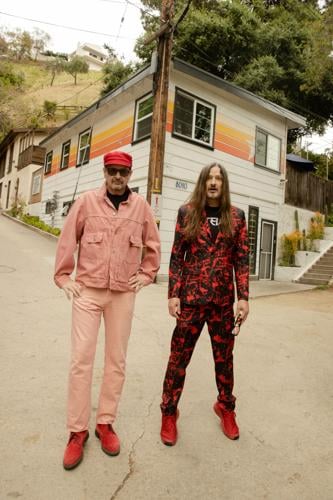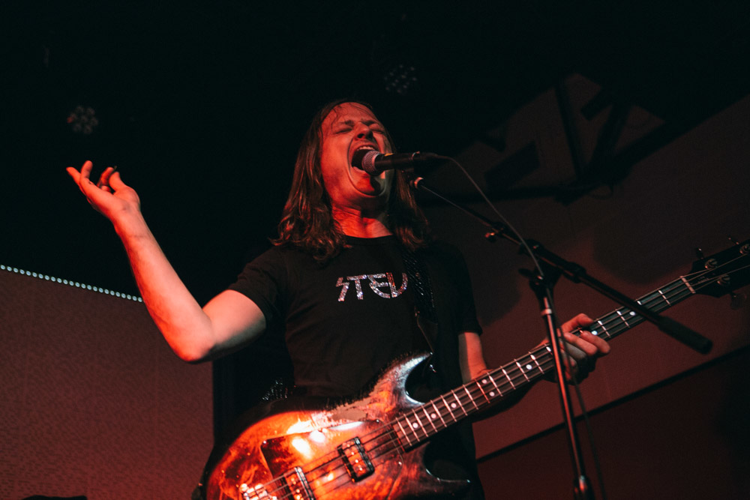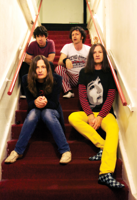
Redd Kross' Jeff and Steven McDonald
Even for a band that’s been around for more than four decades, Redd Kross has had an impressive impact across a huge span of underground music. The earliest work for the group — whose nucleus is brothers Jeff and Steven McDonald, who play guitar and bass respectively — was heavily influenced by the hardcore punk being made by slightly older kids around them, like the members of Black Flag, in the Los Angeles suburbs in the late 1970s. Redd Kross is probably better known for the special concoction of poppy psychedelia with a decidedly low center of gravity that marks albums like 1987’s Neurotica and 1993’s Phaseshifter.
With decades of evolution under their belt, the band is on the road again following the release of a new self-titled LP, and they’re playing The Blue Room at Third Man Records Friday night. An enthusiastic Steven McDonald, who has a long history with Nashville’s own underground music scene, hopped on the phone for a chat before hitting the road. Our interview has been edited for length and clarity.
It’s always fascinating to me when a band decides to make a self-titled record many years into their career. How did that come about for you guys?
We didn't go in the studio preparing to do a self-titled double album. But once we realized we were making a double album, I might have privately thought of a few lyrics from the record that could be an album title, but I never even proposed it. We never got that far with it. Jeff [McDonald] just said with the record cover that he was thinking of something textural, like terrycloth. And I took that one piece of information and put together what I called “The Red Album.” And once I put that idea together in my head, then it just seemed like, “Oh, this is a self-titled album.”
And also the fact that we had been doing interviews for what would become our memoir and our documentary. … I think we’re just very much into exploring who we are, who we've been, who we are now, and what we're going be. [The new album] just felt like an introduction, in a way. I don't know if that sounds pretentious. I think I also felt like — yeah, it's no debut, I guess — but to the lion's share of the population, it would be. And we have this documentary that there's always the potential that it will end up on a streaming platform where people who know nothing about us are exposed to us. And I kept thinking it would be cool if those people who knew nothing about us then looked for our music. And if that happened, what would I want them to go to first? And that's what this record is for me. It's what I want people to see, I think. It's the closest to the vision I've had for making music. … And not to denigrate anything we've done before. I like everything, but I'm a restless musician-artist. I'm always striving to try to get it better.
It’s always seemed like Redd Kross is conscious of your aesthetic choices, like the clothing you wear onstage or on your album covers. Other bands that got their start in the L.A. suburbs in the late 1970s or early ’80s — like Minutemen or Black Flag — you don’t imagine them thinking the same way.
If anything, their aesthetic was to have no aesthetic, as far as clothing goes. I mean, that was their statement. But Jeff and I were younger than those guys. And they were probably reacting to all the music that they loved eight years earlier. But we like that world, that fantasy, that the artist can create. And we've always felt like we were invited to that world by The Beatles and the Stones and KISS and all the music that we were submerged in as children.
So when it came time for us to really kind of stake our claim as artists, it just was a natural progression to want to create some kind of environment that was different than regular life. And part of that was what we would choose to wear. And we're always mixing and matching crap from thrift stores or things thrown away by the general public. And I guess we’re kind of fashion recyclers. And it was also us reacting to the underground music that we’re a part of and just wanting to do our own thing.
I’ve been thinking about a duality within Redd Kross, where your work projects both sunny visions of the late 1960s and the darker side of that era. There’s kind of an admiration and a disgust for what you’re looking back at, similar to what John Waters did with the ’50s. Was there ever a conscious decision about that?
We didn't view it from the standpoint of an archaeologist or a sociologist. There's nothing academic about it. But there was definitely a desire to hold something in esteem that everybody else had seemed to throw away. And also to unapologetically embrace something that might have been considered not cool or embarrassing to our peer group. You gotta kind of put your neck out a little bit sometimes in those kinds of moments to go against the grain of your peer group. I don't know if this is definitely an example of being comparable to John Waters — and him celebrating the ’50s and ’60s — but just going against things.
Like when we had to change the spelling of our name. My brother wouldn't go down this path of just changing the “C” to a “K.” He had to add an extra “D.” And he still hasn't given me a very great answer on why that had to be. His best answer for that was, “Well, it looks more like a proper name. It's like Redd Foxx.” And I often roll my eyes, because it ensures that our name is spelled wrong 50 percent of the time. … If we've ever really thought anything out entirely, it's just been to do our own thing. We might look back at times, but it's never a nostalgia thing. It's just curating what we think has been good about the environment we've inhabited in these last — for me — 57 years.

Steve McDonald with Redd Kross at The Blue Room at Third Man Records, 5/13/2017
A few years ago I interviewed Bill Stevenson from the Descendents and learned about a bait shop in suburban L.A. where Keith Morris from Black Flag and Circle Jerks worked. Stevenson said that punk kids meeting Morris at the bait shop was part of the reason the suburban L.A. punk explosion happened. Were you aware of this place?
That's so funny. Well, it was his dad's bait and tackle shop. And he worked there for his dad. I didn't go there. But my dad — who's still with us, he's 85, he's really active — he likes to go deep-sea fishing. And he was a customer at [Keith’s] dad's shop. And in fact, 15 years ago my dad showed me this fishing rod that he had from that shop. And lo and behold, Keith Morris's writing was on the fishing rod, because that was one of Keith's jobs, to do this sort of calligraphy … to hand-print the rod’s rating or whatever the gauge was, et cetera. And you could tell it was Keith’s writing, and Keith confirmed it.
Was your dad aware of Keith, his role in music and his connection to you?
[At the time we discussed the fishing rod], he certainly was. … My dad's known Keith — not well, but he's known him for years, since we were little kids. Keith Morris once drove me and Jeff to Hollywood when I was 12. We went to a show. Keith lived south of us and he was going north, so he stopped by our house, picked us up, and that was cool. It was kind of hair-raising because he drove crazy, and then he proceeded to party all night, and he kept us out till 5 a.m. And I remember shitting bricks — I couldn't believe that I was gonna get home at 5 a.m. We were hoping to get home, like at midnight or something. So my Dad remembers Keith, probably even from that time.
Redd Kross broke up in the late 1990s and got back together in the mid-Aughts; in the interim, you gained a lot of young fans. That includes Cheap Time as well as Be Your Own Pet, whose first two albums you produced. What was it like to come back and find this whole new youthful fan base?
That was one of the benefits of the internet, I suppose, making your stuff readily available to the next generation. [Our early material is so different from our later material] that a lot of people might not connect the two or think of them as the same band. But the reality is that all the different eras [of Redd Kross] kind of have their own fan base. And Born Innocent was an important record for the Be Your Own Pet kids. What we were doing at that time, it's just got something kind of timeless about it. It's kind of our equivalent to the way there's always a new breed of Beatle freak discovering “I Want to Hold Your Hand” or “Hard Day’s Night” as a gateway of sorts. And in our own sort of weird punk underground way, Born Innocent and the first Red Cross EP are sort of equivalent to that.
And then Be Your Own Pet is a prime example of kids getting guitars and feeling like they have permission to do it themselves. And then someone like [Cheap Time’s] Jeffrey Novak is just an obsessive about underground music. I think it makes sense that our paths would cross. He's an interesting character. He reminds me a lot of people I knew growing up — or myself — and a dedication to finding things that other people are not paying attention to.
And then I had my connection with Nashville. … I know this is the Nashville Scene. I loved going to Nashville and making those first two Be Your Own Pet records with Jeremy Ferguson and the band. And it was the fact that I'm [making a record with them] and I'm so active. … It's like there's a part of me, that preteen in me, still very much there. I don't feel that different, even physically. And so I think it's one of the reasons why I could just relate to those kids and have such a good time making those records with them.
I'm really glad [Be Your Own Pet is] back together. I saw them recently. They put out a new album last year. They recorded it in November of 2022. And I remember I took inspiration from that. Jemina sent it to me, and I thought, “This is awesome. I'm so proud of them. And you know what? I want to do the same thing.” And by November of 2023, I was in the studio making a new record too. [Be Your Own Pet and Cheap Time are] both examples of musicians who have been through a bunch of different things with the industry and with their own relationship with playing music, eventually arriving at this place where they understand why they're doing it. And they're just making the best stuff perhaps of their career. I don't know if I'm drawing that comparison in a very eloquent way, but all I know is I relate to their story as well. And it's so strange, because Jemina called me her mentor, but I feel like I learned from them too.
This has been great, but I also know you've got to get in a van, so I don't want to take up any more of your time.
OK. [Laughs.] Well, hopefully it made sense. … Could I just riff for a second?
Sure.
I just want to say I'm excited to be playing Nashville. When I was in Nashville, making Be Your Own Pet records was during the time of Redd Kross's hiatus — at least during the first Be Your Own Pet record. And I loved being behind the scenes too, helping support young artists and trying to have some kind of positive effect on their experience. But there's also a part of me that probably longed to be doing my band, too. And a part of me that also felt like, “Oh, those days are behind me and I'm no longer a performer.” And so it's neat for me to come back to a place like Nashville — where I lived for a while and kind of experienced music after performing. And so it's always great to go back to that place and realize you might think things are going one direction and then it turns out another way.
I've got good people there now that I've got long relationships with. There's something special about going to Nashville for me and it's all to do with the time I spent working with Be Your Own Pet and Jeremy. And then it's great that we're going to play Third Man. I've always been a fan of what Jack [White] has done and then we've got lots of friends in that world too. And it just kind of ties it all together. I mean, I first met Jack White when … I played bass on the White Blood Cells album and called it Redd Blood Cells. And that's how I met him.









